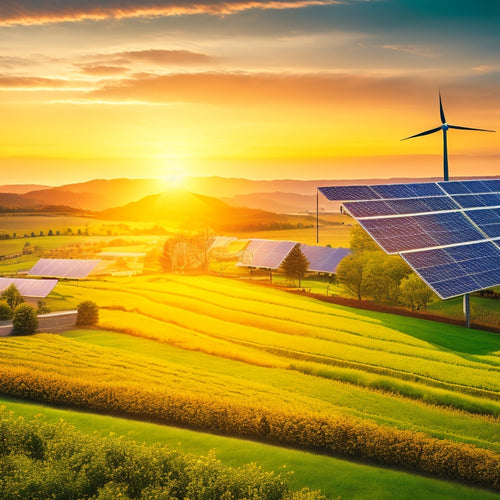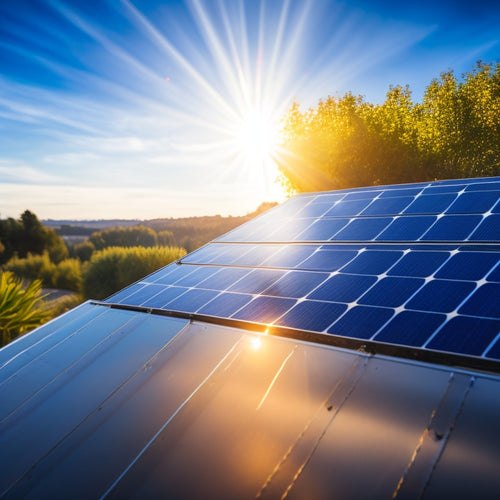
Cost of Home Solar Panels
Share
You can expect to pay between $15,000 and $30,000 for a typical home solar panel system, although the exact cost depends on factors like your location, roof size, and energy needs. However, with the federal solar investment tax credit, you can save up to 26% on installation costs. Furthermore, solar panels can increase your property value, provide long-term savings, and greatly reduce your reliance on the grid. As you consider solar energy for your home, understanding the technical aspects, installation considerations, and environmental benefits can help you make an informed decision. Now, take the next step to revealing the full potential of solar energy for your home.
The Essentials
- The federal solar investment tax credit (ITC) offers up to 26% savings on solar panel installation costs.
- Solar panels can increase property value significantly, providing substantial savings on electricity bills.
- Proper solar installation can eliminate dependence on grid electricity, leading to long-term financial benefits.
- Energy independence achieved through solar panels reduces reliance on utility companies, resulting in predictable monthly energy costs.
- The cost of solar panels varies depending on factors like roof size, location, and system efficiency, but can lead to significant electricity cost savings.
Zero Energy Bills
You'll save money on electricity costs when you install solar panels, and in some cases, you'll even produce more energy than you consume. This means you'll be free from utility bills, enjoying zero energy bills and a reduced carbon footprint.
Electricity Cost Savings
With a home solar panel system, your electricity bills can dwindle to zero, thanks to the abundant free energy from the sun.
You'll no longer be held hostage by rising electricity rates, and you'll enjoy the freedom that comes with energy independence. By utilizing renewable energy from the sun, you'll greatly reduce your carbon footprint and contribute to a healthier environment for future generations Renewable Energy.
As you generate your own clean energy, you'll reduce your reliance on the grid and lower your electricity costs. In fact, you may even produce more energy than you need, allowing you to sell the excess back to the utility company and offset your energy costs further.
The savings can add up quickly, especially with solar panel incentives like the federal solar investment tax credit (ITC), which allows you to claim a tax credit of up to 26% of the total cost of your solar panel system.
Over time, these savings will pay for your system, making your energy independence even more beneficial. With a solar panel system, you'll be in control of your energy costs, and you'll enjoy the peace of mind that comes with knowing exactly how much you'll be paying for electricity each month.
Free From Utility Bills
The ultimate goal of installing a home solar panel system is to eliminate your reliance on the grid and achieve zero energy bills. With a well-designed solar installation, you can enjoy energy independence and greatly reduce your utility bills. In fact, you can generate enough electricity to power your entire home and even sell excess energy back to the grid.
| System Size | Average Daily Energy Production | Monthly Savings |
|---|---|---|
| 3 kW | 12 kWh | $100 |
| 5 kW | 20 kWh | $167 |
| 10 kW | 40 kWh | $333 |
Increased Property Value
You'll find that installing solar panels can greatly increase your property's value, making it more attractive to potential buyers if you decide to sell.
By switching to a home solar system, you can save thousands on your electricity bill average cost of residential solar panel installation and enjoy long-term financial benefits.
Additionally, the panels' ability to generate free energy reduces your reliance on the grid.
The sleek, modern design of solar panels can enhance your home's curb appeal, making it stand out from the competition.
Boosted Resale Potential
Several studies have consistently shown that installing solar panels can greatly enhance your property's resale value.
In fact, a study by the National Renewable Energy Laboratory found that solar panels can increase your property's value by up to $15,000. This is because solar panels are viewed as a desirable feature by many homebuyers, particularly in areas with high energy costs.
Moreover, as homeowners shift towards sustainable living and energy efficiency, features like Rooftop Solar Power are becoming increasingly attractive.
With the growing concern about climate change and energy efficiency, solar panel trends are shifting towards increased adoption. Homebuyers are willing to pay a premium for properties with solar panels, which can considerably elevate your property's resale value.
Additionally, solar panels can differentiate your property from others on the market, making it more attractive to potential buyers.
Enhanced Curb Appeal
One of the most significant advantages of installing solar panels is the enhanced curb appeal they bring to your property, which directly translates to increased property value. This improvement in appeal can be attributed to the sleek, modern design of solar panels, which can seamlessly integrate into your home's exterior.
In fact, many homeowners consider solar panels a desirable feature, especially when paired with other home exterior upgrades, such as new roofing or siding.
The solar panel aesthetics have come a long way, with many manufacturers now offering panels in various colors and styles to match your home's unique design. As a result, solar panels can actually enhance your home's visual appeal, rather than detract from it.
According to the National Renewable Energy Laboratory, homes with solar panels sell for up to $15,000 more than similar homes without them. This increased property value can be a significant selling point if you decide to sell your home in the future.
Inverter Efficiency Explained Here
You're likely familiar with the importance of inverters in your solar panel system, but do you know how they impact your energy output?
When it comes to off-grid systems, understanding inverter efficiency is essential to maximize energy conversion.
The inverter's efficiency is measured by its ability to maximize energy conversion, which is influenced by two key factors: Max Power Point Tracking (MPPT) and Energy Conversion Ratio.
Understanding these concepts will help you make an informed decision when selecting an inverter for your home solar panel system.
Max Power Point Tracking
Max Power Point Tracking
How do inverters optimize energy harvesting from solar panels? One key technology that enhances solar efficiency is Max Power Point Tracking (MPPT). MPPT is a tracking technology that guarantees your solar panels operate at their maximum potential, even on cloudy or partially shaded days.
| Conditions | MPPT Benefit |
|---|---|
| Partial Shading | Up to 30% more energy harvested |
| Temperature Fluctuations | Up to 10% more energy harvested |
| Module Mismatch | Up to 5% more energy harvested |
You'll notice that MPPT technology can notably increase energy harvesting under various conditions. By continuously monitoring the voltage and current output of your solar panels, MPPT inverters adjust their operating point to maximize energy production. This results in more power and, ultimately, greater savings on your energy bills. By incorporating MPPT into your solar panel system, you'll be able to enjoy the full benefits of solar energy and achieve greater freedom from traditional energy sources.
Energy Conversion Ratio
As you investigate deeper into the world of solar energy, understanding the Energy Conversion Ratio (ECR) is vital for maximizing your system's performance.
ECR, also known as inverter efficiency, measures how effectively your solar inverter converts DC power from your panels into AC power for your home. A higher ECR means more of the sun's energy is converted into usable electricity, resulting in greater solar efficiency.
Inverters with high ECRs are important for optimizing your system's output. Modern panel technology has led to significant advancements in ECR, with top-performing inverters boasting efficiencies of up to 98%.
This means that for every 100 units of DC power generated, 98 units are converted into usable AC power. When selecting an inverter, look for models with high ECRs to guarantee you're getting the most out of your solar investment.
Check Your Roof Size
You'll need to assess your roof's size to determine how many solar panels it can accommodate, as a larger roof provides more space for a solar array.
When considering off-grid energy solutions, it's crucial to evaluate your roof's capacity to support your energy needs.
The square footage of your roof will impact the number of panels you can install, which in turn affects the overall cost of your solar panel system.
A smaller roof may require more efficient panels or a different system design to meet your energy needs.
Roof Size Matters
Across the top of your home, your roof provides an essential surface for utilizing the sun's energy, but its size plays a significant role in determining how many solar panels you can install. A larger roof allows for more panels, which can lead to greater energy production and savings.
However, it's not just about the size – the orientation of your roof matters too. A south-facing roof is ideal, as it receives the most direct sunlight throughout the day. East- and west-facing roofs are also suitable, but north-facing roofs may not be appropriate for solar panels due to limited sunlight.
Before installing solar panels, you'll need to conduct a shading analysis to identify any obstructions that could impact energy production. Trees, chimneys, and skylights can all cast shadows on your roof, reducing the effectiveness of your solar panels.
Square Footage Impact
The size of your roof, measured in square footage, directly impacts the number of solar panels you can install. A larger roof provides more space for solar panels, allowing you to generate more electricity and increase your energy independence. However, it also means higher installation costs, as more panels and materials are required.
On the other hand, a smaller roof may limit the number of panels you can install, but it can also reduce installation costs. It's crucial to evaluate your roof's square footage to determine the best number of panels for your energy needs.
Additionally, consider the solar panel efficiency, as more efficient panels can generate more power in a smaller space.
When considering your roof's square footage, also account for obstructions like skylights, vents, and chimneys, which can reduce the available space for solar panels.
Lower Carbon Footprint Guaranteed
By installing home solar panels, you'll greatly reduce your reliance on fossil fuels, which in turn decreases the amount of greenhouse gas emissions released into the atmosphere.
As a result, your carbon footprint will shrink, contributing less to climate change and air pollution.
With solar energy, you'll be producing clean electricity, reducing your emissions and helping to combat global warming.
Reduce Greenhouse Gas Emissions
One significant advantage of switching to home solar panels is that they can substantially reduce greenhouse gas emissions from your household.
As you generate clean energy, you'll decrease your reliance on fossil fuels, which are major contributors to climate change. By investing in solar technology, you'll be doing your part to mitigate the environmental impacts of traditional energy sources.
Solar panels produce zero emissions or pollution during operation, making them an attractive option for those seeking to minimize their carbon footprint.
According to the United States Environmental Protection Agency, a typical household can reduce its carbon emissions by up to 3 tons per year by switching to solar power.
That's equivalent to planting over 50 trees or avoiding 6,000 miles of driving.
Frequently Asked Questions
Can I Install Solar Panels on a Rented Property?
You can install solar panels on a rented property if you negotiate a solar panel agreement with your landlord, ensuring you understand your tenant rights and responsibilities, but be prepared to remove the panels when your lease ends.
Do I Need to Clean My Solar Panels Regularly?
You'll need to clean your solar panels regularly to maintain their efficiency, but the frequency depends on your location and climate; typically, you'll want to clean them every 6-12 months as part of your panel maintenance routine.
Are Solar Panels Affected by Shade or Trees?
As you deliberate on utilizing solar power, thou shalt consider the medieval nemesis of solar panel efficiency: shading. Trees and shadows can greatly reduce output, so thou must carefully assess the impact of shading on thy system's performance.
Can I Add More Panels to My Existing System?
You can expand your existing solar panel setup by adding more panels, but you'll need to guarantee your system's capacity can handle the increased power output, and that your inverter and electrical infrastructure can support the solar panel expansion.
Do Solar Panels Work During a Power Outage?
Like a phoenix rising from the ashes, you're seeking freedom from grid dependence. During a power outage, your solar panels won't work alone, but with solar battery integration, you'll achieve grid independence, ensuring your lights stay on, even when the grid goes dark.
Final Thoughts
As you weigh the cost of home solar panels, remember: it's not just about the upfront expense, it's about the long-term benefits. Think of it as an investment in your future, where zero energy bills and increased property value are just the beginning. You'll be reducing your carbon footprint, and with inverter efficiency on your side, you'll be utilizing the sun's power like a pro. So, what's the real cost of home solar panels? It's the cost of not switching to renewable energy.
Related Posts
-

Net Metering in Renewable Energy's Future
Net metering's future is vital for driving renewable energy growth and financial savings. You can reduce your electri...
-

Key Components of a Reliable Emergency Power Supply System
A reliable emergency power supply system requires several key components. You need proven performance metrics to guar...
-

How Efficient Are Thin Film Solar Cells
Thin film solar cells provide an innovative approach to energy generation, boasting efficiency rates generally betwee...


